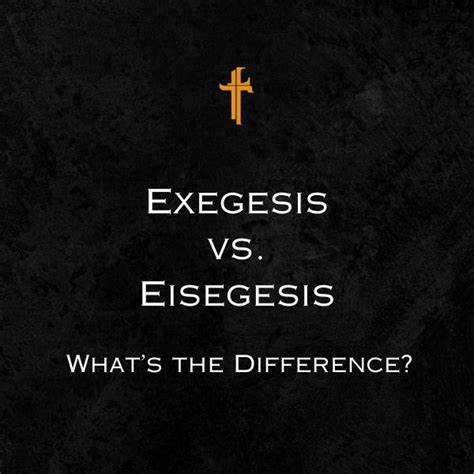Eisegesis is the process of interpreting a text by inserting one's own biases, perspectives, or ideas into the text, rather than drawing out the text's original meaning (known as exegesis). This practice is widely discussed in fields such as religious studies, literature, and history. Understanding the nuances of eisegesis is crucial, as it highlights the differences between subjective interpretation and objective analysis. In this article, we will explore the advantages and disadvantages of eisegesis, aiming to provide a comprehensive overview of its impact on textual interpretation.
Understanding Eisegesis: How Personal Bias Shapes Text Interpretation
Section 1: Understanding Eisegesis
Definition and Origin
Eisegesis comes from the Greek words "eis," meaning "into," and "hegeomai," meaning "to lead." It refers to the practice of reading one's own ideas or biases into a text, rather than extracting the text's original meaning. This differs significantly from exegesis, which seeks to uncover the author's intent and the text's original context.
Contexts of Use
Eisegesis is prevalent in various contexts, including religious texts, literature, and historical documents. For example, in religious studies, individuals might interpret scriptures based on their own beliefs and experiences. In literature, readers might find personal relevance in a novel or poem, infusing it with their own perspectives. Similarly, historians may interpret events through the lens of contemporary issues or personal ideologies.
Section 2: Advantages of Eisegesis
Personal Relevance
One of the main advantages of eisegesis is that it allows readers to find personal relevance and meaning in a text. By applying their own experiences and beliefs, readers can connect more deeply with the content. This personal engagement can make the reading experience more enriching and meaningful.
Creative Interpretation
Eisegesis encourages creative and diverse interpretations, leading to new insights and perspectives that might not be apparent through traditional exegesis. This creative approach can foster innovation in literary and theological studies, as it allows for multiple layers of understanding and appreciation.
Adaptability
This approach makes texts adaptable to different contexts and times. As society and cultural values change, eisegesis can help reinterpret texts to maintain their relevance. By reimagining texts in contemporary settings, readers can find new applications and insights that resonate with modern issues.
Subjective Exploration
Eisegesis permits a subjective exploration of texts, allowing individuals to express their personal viewpoints and emotions in relation to the material. This can lead to a deeper emotional connection with the text and foster a more profound appreciation of its themes and messages.
Section 3: Disadvantages of Eisegesis
Distortion of Original Meaning
The primary disadvantage of eisegesis is that it can lead to a distortion of the text's original meaning. When readers impose their own biases and perspectives on a text, they may overlook or misinterpret the author's intended message. This can result in a skewed understanding of the text, potentially altering its significance and purpose.
Lack of Objectivity
Eisegesis lacks objectivity, as it is influenced by the reader's personal experiences and beliefs. This subjectivity can undermine the credibility and accuracy of the interpretation, especially in academic or scholarly contexts where objectivity is paramount. Personal biases can cloud judgment, leading to interpretations that reflect the interpreter's mindset rather than the text itself.
Misapplication
In contexts such as legal or historical analysis, eisegesis can be problematic. Misinterpreting foundational documents based on personal views can lead to significant errors or misunderstandings. For example, legal texts require precise and objective interpretation to ensure fairness and justice. Applying eisegesis in such contexts can result in flawed legal decisions or historical inaccuracies.
Divisiveness
Since eisegesis is highly subjective, it can lead to divisive interpretations and conflicts. Different individuals may have varying personal readings of the same text, which can create disagreements and misunderstandings. This is particularly evident in religious or ideological discussions, where conflicting interpretations based on personal biases can result in heated debates or even social divisions.
Section 4: Balancing Eisegesis and Exegesis
Importance of Balance
Achieving a balance between eisegesis and exegesis is crucial for a well-rounded understanding of texts. While eisegesis allows for personal engagement and relevance, exegesis ensures that the text's original meaning and context are preserved. Combining both approaches can provide a deeper and more nuanced interpretation.
Practical Tips
Awareness: Be aware of your own biases and perspectives when interpreting a text. Recognize when you might be imposing your views and strive to separate them from the text's original message.
Contextual Research: Conduct thorough research to understand the historical, cultural, and linguistic context of the text. This will help ground your interpretation in the text's original setting.
Consult Multiple Sources: Refer to various interpretations and commentaries to gain a broader perspective. This can help you identify common themes and discrepancies, allowing for a more balanced understanding.
Reflect and Revise: Regularly reflect on your interpretation and be willing to revise it as you gain new insights or information. This iterative process can help refine your understanding and reduce personal biases.
Conclusion
In conclusion, eisegesis offers a unique way of engaging with texts by allowing personal interpretation and relevance. Its advantages include fostering a deeper personal connection, encouraging creative perspectives, and making texts adaptable to different contexts. However, it also presents significant challenges, such as distorting the original meaning, lacking objectivity, and potentially causing divisiveness.
Achieving a balance between eisegesis and exegesis is essential for a comprehensive understanding of texts. By combining personal insights with contextual and objective analysis, readers can appreciate the depth and richness of the material while remaining true to its original intent.






